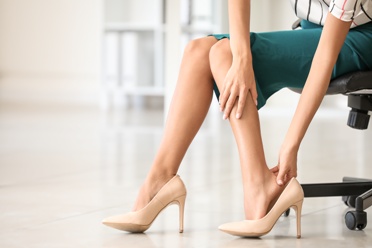
Let’s face it; women are not wearing high heels for comfort. Even your best, most expensive pair will leave your feet aching after a couple hours. High heel shoes can cause a number of foot problems, yet most women are not willing to give their shoes up.
The reason high heels negatively affect so many parts of your body is because when you are a shoe that has elevation or a heel, your weight gets shifted forward to the ball of the foot. The higher the heel, the more weight and pressure get shifted forward. Your knees and hips then have to push forward and your back has to hyperextend backwards to counterbalance. Your whole skeleton gets misaligned, causing leg, hip, and back pain.
How Your Feet Affect Your Whole Body
Good foot health is essential for an active life. With 26 bones, 33 joints and over 100 muscles, ligaments and tendons, your feet are incredibly complex. And they serve as the foundation for your entire body in terms of support, balance, posture, and overall well-being. You can experience pain in your knees, hips and lower back when you have ongoing foot problems. Foot issues can also cause imbalance, poor posture, and even problems with organ function.
So what are the biggest things that your feet can affect?
1. Posture
Poor posture can occur as a result of how you stand and walk. If these behaviors go uncorrected for too long, they usually result in foot, knee, and back pain.
2. Organ Function
Your feet actually help influence your organ health. The millions of nerves in your feet send messages to your brain, and if they are not functioning at an optimal level, your brain will begin to overcompensate.
3. Fallen Arches
Fallen arches result in poor alignment of your body. When your feet no longer have the proper arch support they need, there is nothing to absorb the shock that comes with each and every step you take. Over time, the stress will travel up your body and be placed on joints, such as the knees and hips.
Do High Heels Really Cause Foot Damage?
- Strains, Tears and Fractures
The angle a high-heeled shoe puts your foot could cause short-term and even chronic pain in the ball of your foot and toes. High heels places the foot in a position in which the forefoot bears more weight than normal, placing more pressure on the ball of the foot and metatarsal heads or middle joints. This excess pressure can cause pain in the joints in the ball of the foot, known as capsulitis or metatarsalgia, and can lead to stress fractures, tendon/ligament tears and contractures or stiffness.
- Heel and Arch Pain
The unnatural position of a high heel strains the arch of the foot so that the foot is always pointing downward. Over time, this can make it impossible for the wearer to walk or stand barefooted without pain. Heels can even reshape the calf muscles and tendons, shortening them so that women who wear heels often may find it uncomfortable to walk flat-footed.
- Toe Injuries and Deformities
Shoes with a narrow, pointed toe force your toes into an unnatural V-shape. If you wear high heels every day, over time they could cause toe deformities such as hammertoes or claw toes, bunions, corns and calluses and ingrown toenails. Pointy-toed shoes can cause metatarsalgia and neuroma, and inflammation of the nerve between the toes. The pinched and inflamed nerve causes pain and burning and may need to be treated with injections, physical therapy or even surgical removal of the neuroma.
- Ankle Sprains
Ankle and foot sprains as well as fractures may happen when wearing high heels. In high heels, the foot is pointed down, which makes it easy to sprain or turn the ankle. The higher the heel, the more the body weight is pushed forward. The wearer must lean backward and use more lower leg muscle power to maintain balance. The higher the heel, the higher the risk of losing balance and injuring the foot or ankle. Ankle sprains, ankle fractures, or even foot fractures can occur and some may be serious requiring surgery.
- Knee and Back Pain
As you work to keep your body balanced on your heels, the rest of your body is having to adjust as well. Heels affect the body mechanics of how you walk, stand and carry yourself. This can put undue stress on your knees, hips and lower back. While the pain may be mild at first, wearing high heels everyday can lead to chronic pain and arthritis.
Foot Problems Caused By High Heels
Repeatedly wearing high heels can cause all sorts of painful problems. According to one survey, over half of all women wear high heels, and 71 percent of them admitted that they cause them pain and discomfort.
- Bunions
High heels can also trigger the development of painful bunions, where your big toe joint is out of alignment with the rest of your toe joints. With time, the bunion grows, causing your big toe to bend toward or on top of the next toe. In high heels, the weight distribution across your foot is altered tremendously. Instead of walking heel to toe, you put most of the pressure on the ball of the foot.
- Corns and Calluses
Corns and calluses develop from repeated friction, rubbing or irritation and pressure on your skin. Wearing high heels can result in a corn on the top or side of your toes, as well as a callus on the sole of your foot. The afflicted part of the foot thickens and becomes uncomfortable. A podiatrist can remove the corn or callus.
- Hammertoe
Trying to fit a rectangular-shaped foot into a triangular shoe will not only cause discomfort, but can actually changes the shape of the foot, causing structural bony problems. The narrow toe bed of a high heel squeezes and cramps the toes, which can lead to a condition called hammertoe, where your toes curl under.
- Achilles Tendonitis
The Achilles tendon connects the heel bone to the calf muscles. It makes it easier to stand, walk, run, and leap. Wearing high heel shoes regularly might inflame the Achilles tendon and limit your range of motion.
- Plantar Fasciitis
High heels distribute your weight unevenly and force the arch of your foot into an unnatural position. This impacts your gait as well as the way the force from walking and other activity is distributed–putting a strain on your arch and causing tearing and inflammation. High heels also typically fail to support your heels with cushioning, meaning that the pad of your heel is pressed into a hard, unsteady surface.
- Haglund’s Deformity
Haglund’s Deformity is a bony enlargement of the back of the heel bone. Sometimes it is called “pump bump” because the deformity often occurs in women who wears pumps. The shape of your foot can contribute to the development of Haglund’s Deformity. If you have high arches, a tight Achilles tendon, or a tendency to walk on the outside of your feet, you are more likely to develop Haglund’s Deformity than other people. Wearing shoes with a firm, rigid back may also contribute to the development of Haglund’s Deformity.
- Morton’s Neuroma
Morton’s neuroma is a benign but painful condition that affects the ball of the foot. It’s also called an intermetatarsal neuroma because it’s located in the ball of the foot between your metatarsal bones. It happens when the tissue around a nerve that leads to a toe thickens from irritation or compression. Morton’s neuroma is often caused by shoes that are too tight or that have a high heel. These shoes can cause the nerves in your feet to become compressed or irritated.
Treatment for Foot and Heel Pain
Your doctor will often recommend these steps first:
- Acetaminophen or ibuprofen to reduce pain and inflammation
- Heel and foot stretching exercises
- Night splints to wear while sleeping to stretch the foot
- Resting as much as possible for at least a week
- Wearing shoes with good support and cushions
- Apply ice to affected area at least twice a day for 10 to 15 minutes
If these treatments do not work, your doctor may recommend wearing a boot cast for three to six weeks or custom-made shoe inserts.
Ask Your Doctor
Foot problems can lead to significant functional loss and disability. Depending on the severity of the injury, the loss may be temporary or permanent. Making good choices in your footwear now could reduce the risk of serious injury later in life.
To learn more about bone health or to schedule an appointment with one of our specialists, call us at 800-698-1280.

